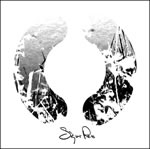|
|
 |
Dusted Reviews
Artist: Sigur Rós Album: ( ) Label: MCA Review date: Dec. 8, 2002 |

|
|
|
 |
Untitled (or how I learned to start listening and tolerate Iceland)
Sigur Rós make intensely visual music. The kind that conjures up images of blue skies, lush green Icelandic fields, and androgynous pink pre-teen soccer players (yeah, you remember that video). When in the right mood, I, for one, would be completely content listening to their brand of ethereal dream pop while watching anything at all; a snowfall at dusk, a parking lot at 3 p.m., my Snoop Dogg/Christopher Walken screensaver. Somehow, through the rose-colored filter of their majestic mini-symphonies, it’s all equally poignant.
But, as was the case the first three or four times I heard their breakthrough second album, Ágætis Byrjun (which I dismissed early on as a 70-minute oooooooh), there’s still the possibility that Sigur Ros will sound infernally annoying. On days when sitting and absorbing the scenery is activity enough, there's an unmatchable beauty to their painstaking compositions, but on other days when it's muggy and traffic is thick, few things are quite as irritating. It has something to do with the band's patience, their unabashed dreaminess, and quite possibly singer/guitarist Jonsi Birgisson's decision to intone his falsettos in an invented language called Hopelandic, but, in keeping with the band's motif of imprecision, not much else is certain.
That said, this is still gorgeous music. Even the things that can make it cloying at times contribute to the effectiveness of the band's sprawling soundscapes; while the variable is the listener's openness to them, the songs are vast, unhurried, and vivid, and that only makes them more powerful. Somewhere between the finer moments of latter day Radiohead and the calmer elements of Mogwai and tourmates Godspeed You! Black Emperor, Sigur Rós somehow translate painstaking into evocative, slow into moving, and often plainly cinematic into downright cathartic. Using guitar effects and strings (or guitar played with a violin bow), piano, organ, and lightly brushed drums, they make idyllic and otherworldly chamber pieces; fleeting sounds appear and disappear like ghosts before they can be identified — the odd churn of distortion or twinkle of piano keys — but the sum total is undeniably redolent and generally beautiful.
For the most part, ( ) (eight six- to thirteen-minute songs without titles or proper lyrics), is the logical extension of Ágætis Byrjun, relying on the same interplay of instruments to create a similarly picturesque and eerily calm atmosphere. The first few (untitled) songs are a bit more subdued than Byrjun was; they're more lyrical than active, and the scarcity of drums and feedback trades creaky charm for lush soulfulness. The first track, for instance, is driven by a simple and poignant piano line, joined only by Birgisson's croon and fragile strings, while the second, with its messy tape loops and melancholy violin line, wouldn't sound out of place on Kid A. But ( ) recaptures some of the gritty (passive) dynamism of older work on the fourth song, which is steeped in feedback and echoes and could be this album's counterpart to the Byrjun single “Svefn-G-Englar.”
From there the record gets moodier and stronger; the pulsing bassline of the fifth track counters the eerie vocal yelps (some of which may, in fact, be horns) to recall Radiohead again, while the sixth creaks and thumps toward an astonishingly sublime climax, easily ( )'s best moment. The seventh song builds similarly from a hushed organ drone to a chaotic release, all cymbals and bass drum trumping Birgisson's muted repetitions. The final track, at twelve minutes, is the album's most steadily paced and almost structured, returning to themes like choruses before one last tense, Godspeed-esque buildup to an almost caustic burst, closing ( ) with a force opposite to its fragile beginning.
Birgisson's howl adds a sort of primal urgency to the music, but its decreased prominence here is one of ( )'s strengths. With the exception of more traditional verse-chorus songs (which don't happen often), the instrumentals would be no less compelling without his gushed nonsense. His voice is a versatile tool which he wields convincingly, but talented or not, it's often his Hopelandic that threatens to push the songs over the line between pretty and cheesy.
The best way to listen to Sigur Rós, as with Godspeed, Mogwai, etc, is closely and patiently; giving their sprawling suites more attention than the average three-minute pop song makes it easiest to hear them for their understated beauty rather than dismiss them for their cloying formlessness. True, sometimes there's just not time to do that — some days are not meant for Sigur Rós. But when the mood allows, and there's time to let it all sink in, an album like ( ) is indispensable nearly from beginning to end. And once the final track is over and the feedback cuts out, the rewarded exhaustion of a close listen is rivaled only by a desire to be able to always watch the world go by with a soundtrack like this.
By Daniel Levin Becker
|







